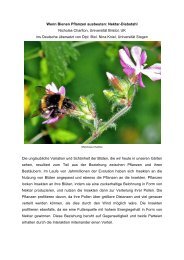PhDâ€theses - Ethologische Gesellschaft
PhDâ€theses - Ethologische Gesellschaft
PhDâ€theses - Ethologische Gesellschaft
Create successful ePaper yourself
Turn your PDF publications into a flip-book with our unique Google optimized e-Paper software.
TESTING FOR SOCIAL DIFFUSION OF TWO NOVEL FORAGING SKILLS AND CONFORMITY IN<br />
WILD REDFRONTED LEMURS (EULEMUR RUFIFRONS)<br />
Anna Viktoria Schnöll<br />
a0402262@unet.univie.ac.at<br />
Research Update<br />
Diplom Thesis, supervised by Dr. Claudia Fichtel, Prof. Dr. Peter Kappeler, Abt. Verhaltensökologie &<br />
Soziobiologie, Deutsches Primatenzentrum , Göttingen, Prof. Dr. Ludwig HIber, Abt. Kognitive<br />
Biologie, Universität Wien<br />
Recent research revealed that traditions are not a unique feature of human culture, but that<br />
they can be found in animal societies as well. However, the underlying mechanisms and<br />
conditions leading to social diffusion of newly invented behaviours, as well as the<br />
importance of the formation of traditions for animals living in the wild, are still poorly<br />
understood. To address these questions, I conducted a social diffusion experiment with<br />
three wild groups of redfronted lemurs (Eulemur rufifrons). I used a ‘two‐option’ feeding<br />
box, where animals could either open or push a door to get access to a fruit reward to study<br />
whether and how the trait spreads through the groups. Half of the 28 study animals were<br />
able to learn the new feeding skills and mainly kept a seeded technique (groups with<br />
training) or adjusted (group without training) their behaviour to the majority of the group.<br />
Individuals observing others more often needed fewer trials until they could successfully<br />
open the door, indicating that social learning played an important role in acquiring the task.<br />
An option bias analysis suggested that social learning was involved in the spread of the novel<br />
behaviours, whereas a network‐based diffusion analysis indicated pure asocial learning.<br />
Moreover, redfronted lemurs invented a third technique for accessing the reward:<br />
scrounging. Interestingly they did not scrounge more often from kin. Thus, redfronted<br />
lemurs are able to form behavioural traditions. In addition, these results suggest that the<br />
study animals did not simply keep the first rewarded technique but showed a high flexibility<br />
in choosing between social and individual learning.<br />
21



